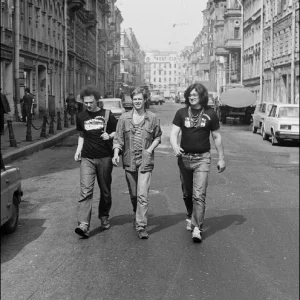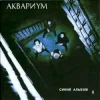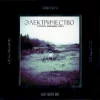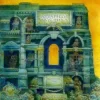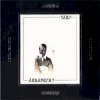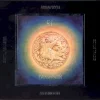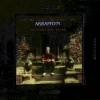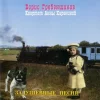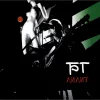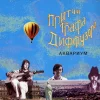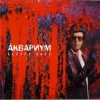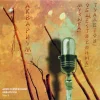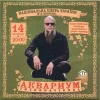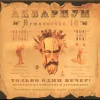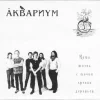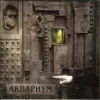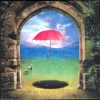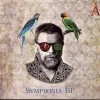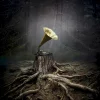History Аквариум
Аквариум (Aquarium) is a Russian rock group, formed in Leningrad, Russia in 1972 by Борис Гребенщиков (Boris Grebenshchikov), then a student of Applied Mathematics at Leningrad State University, and Анатолий Гуницкий (Anatoly "George" Gunitsky), a playwright and absurdist poet.
In the 1970s and early 1980's, rock and roll was banned in the Soviet Union (exception was given only to a few government-approved artists), and Aquarium's usual concert venues were private apartments. These concerts were a unique Soviet phenomenon, created by underground musicians. They were usually "unplugged", as noise would cause the neighbors to alert the authorities. The limited space fostered an atmosphere of intimacy between the group and its audience, listening with bated breath, with perhaps someone recording it on a simple tape recorder. This was similar to the concepts of the Russian bards (russian bard), however Aquarium were (admittedly) much more influenced by Western music, particularly by The Beatles, Bob Dylan, David Bowie, progressive rock acts Jethro Tull, King Crimson and Roxy Music and also reggae. Thus their compositions were considerably more complex and their lyrics covered a broader range of topics, showing Grebenshchikov's notable erudition in Celtic and Indian cultures, among other things.
Until 1987 Aquarium recorded all of their albums in a self-assembled underground studio (several members had engineering education) disguised as a "Young Technicians Club" (for the album Радио Африка (Radio Africa) (1983) a government-owned mobile studio was secretly used, after bribing a technician). Despite those hard conditions, the recording quality was rather high and Aquarium's albums between 1980 and 1987 are considered by most fans as their best.
The advent of Glasnost in 1985 brought many underground Russian rock musician to public recognition and Aquarium became one of the most popular Russian bands. They were allowed to play in large concert halls, appeared on the state-owned television and recorded soundtracks for several films, most notably ASSA. In 1987 they recorded their first album for the state-owned Melodiya record label. With official backing and legalized distribution the album was a huge hit in USSR, selling well over a million copies within a few months. This was, however, the last album recorded by this Aquarium line-up and the band broke up shortly afterward. Grebenshchikov released two albums in English and toured with several different backing bands. In 1991 after the break-up of Soviet Union he released Русский Альбом (The Russian Album) under the name BG-Band, a collection of melancholic folk songs influenced by his travels all over Russia and demonstrating a return to his Russian roots. Shortly afterwards BG-Band was renamed Aquarium although most of the musicians were different. This band continued to release more albums and touring extensively all over former Soviet Union and Eastern Europe and also appearing before Russian immigrant communities in Germany, Israel and United States.
Although often criticized for departure from their original style and constant line-up changes which make Aquarium essentially a Grebenshchikov solo project, the group still enjoys huge success in Russia - their songs, old and new, get a lot of airplay, their albums sell well, and they tour constantly.
Creative Commons By-SA License
 FM
FM
